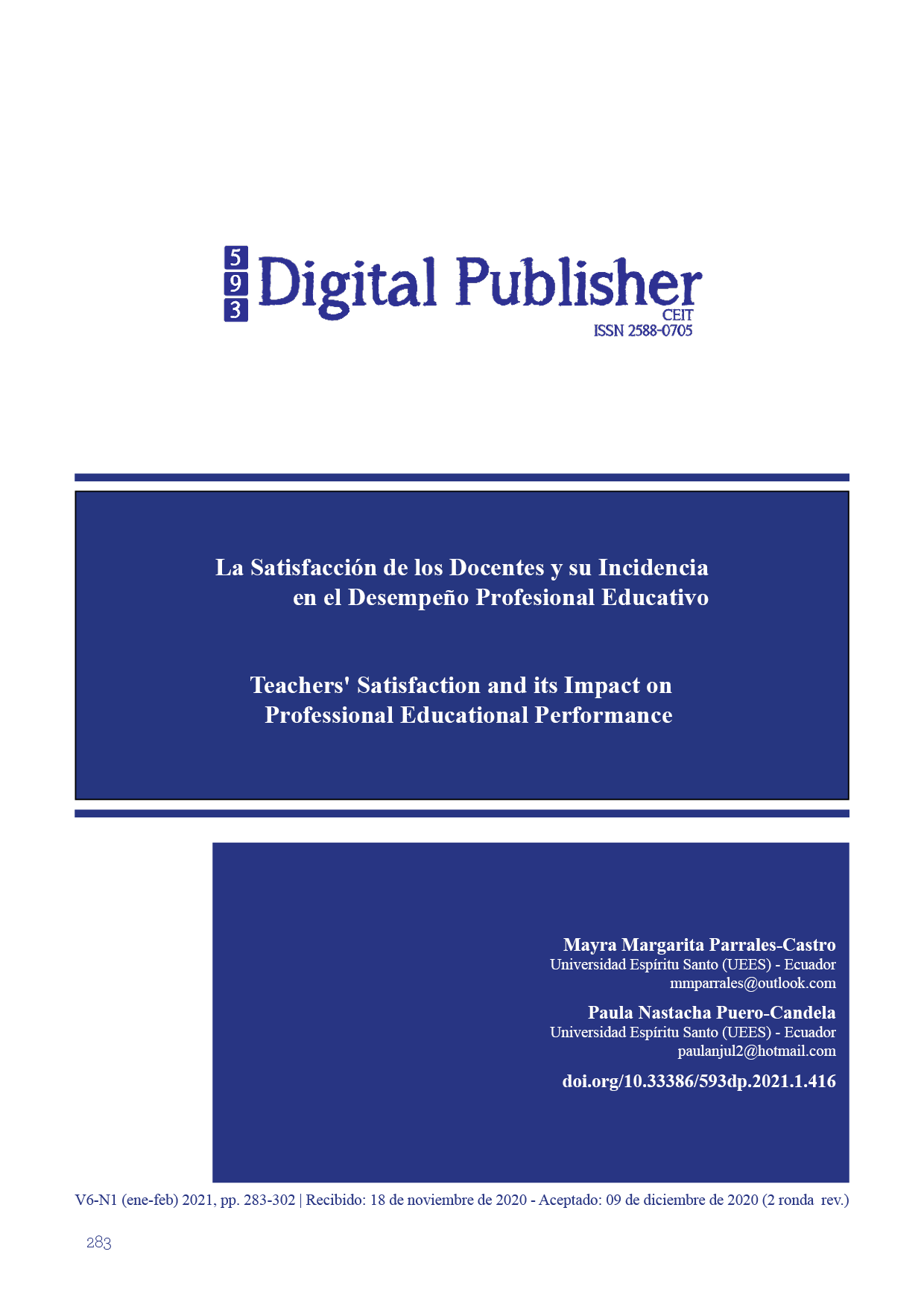Teachers' Satisfaction and its Impact on Professional Educational Performance
Main Article Content
Abstract
The present work aims to contribute with administrative strategies focused on improving the incidence of teacher satisfaction within their educational professional performance. To do this, scientific research methods such as the historical-logical method were used to determine the behavior of the variables over time and within the research context itself, and thereby infer the level of participation of professional performance in the achievement of organizational objectives.
It is also important to highlight that there is a close relationship between organizational climate, satisfaction and performance, taking into account productivity and performance that are predictors of satisfaction that allow establishing the work and professional performance of teachers according to their profile.
It is also necessary to indicate that this study has as its dimension or purpose the analysis of the data, based on a mixed approach that describes the variables and seeks to explain their changes and movements within the incidence of professional performance, due to the studies carried out on Teacher job satisfaction has led to different investigations aimed at the emotional, personal and work well-being of this magnificent profession.
Downloads
Article Details

This work is licensed under a Creative Commons Attribution-NonCommercial-ShareAlike 4.0 International License.
1. Derechos de autor
Las obras que se publican en 593 Digital Publisher CEIT están sujetas a los siguientes términos:
1.1. 593 Digital Publisher CEIT, conserva los derechos patrimoniales (copyright) de las obras publicadas, favorece y permite la reutilización de las mismas bajo la licencia Licencia Creative Commons 4.0 de Reconocimiento-NoComercial-CompartirIgual 4.0, por lo cual se pueden copiar, usar, difundir, transmitir y exponer públicamente, siempre que:
1.1.a. Se cite la autoría y fuente original de su publicación (revista, editorial, URL).
1.1.b. No se usen para fines comerciales u onerosos.
1.1.c. Se mencione la existencia y especificaciones de esta licencia de uso.
References
Alcántara, G. (2008). La Definición de Salud de la Organización Mundial de la Salud. Revista Universtaria de Investigación Sapiens, 9(1), pp. 93-108. Obtenido de https://dialnet.unirioja.es/descarga/articulo/2781925.pdf
Álvarez, B., Porraspita, D., & Indacochea, B. (2018). El desempeño laboral: un problema social de la ciencia. Revista Didáctica y Educación, 9(2), pp. 1-12. Obtenido de https://dialnet.unirioja.es/descarga/articulo/6596591.pdf
Caballero, K. (2002). El concepto de satisfacción en el trabajo y su proyección en la. Revista de currículum y formación del profesorado, 6(1). Obtenido de https://dialnet.unirioja.es/servlet/articulo?codigo=5297145
Canton-Tellez. (2017). La satisfacción en el desempeño profesional de los docentes en la educacion infantil y de educacion primaria. Un estudio de caso. Curriculum Información del profesorado, 21(1), 279-292.
Chiavenato, I. (2009). Gestión del talento humano. Mexico: McGraw Hill Educación.
Escribano, E. (2018). El desempeño del docente como factor asociado a la calidad educativa en América Latina. Revista Educación, 42(2). doi:https://doi.org/10.15517/revedu.v42i2.27033
F. Mansilla Izquierdo, J. G. (Septiembre 2011). Medicina y Seguridad. Sociedad Española de Medicina y Seguridad del trabajo, 6(3).
Hernandez, R., Fernandez, C., & Baptista, M. D. (2014). Metodologia de la Investigacion. Mexico: Interamericana Editores.
https://educacion.gob.ec. (s.f.). desempeño docente.
L.H., S. P., & Paravic K., T. (2002). satisfaccion laboral en enfermeras/os que trabajan en el sistema de atencion medica de urgencia (SAMU). Ciencia y enfermeria.
Lee, X., Yang, B., & Li, W. (2017). The influence factors of job satisfaction and its relationship with turnover intention: Taking. Anales de Psicología, 33(3), pp. 697-707. Obtenido de https://www.redalyc.org/pdf/167/16752019028.pdf
Machuca, M. (2016). El clima organizacional y el desempeño laboral en la municipalidad de leoncio prado tingo maría 2015. Tesis de Grado. Tingo María, Perú: Universidad Nacional Agraria De La Selva.
Manosalvas, C., Manosalvas, L., & Nieves, J. (2015). El clima organizacional y la satisfacción laboral: un análisis cuantitativo riguroso de su. Revista AD-minister(26), pp. 5-15. Obtenido de https://www.redalyc.org/pdf/3223/322339789001.pdf
Maria Guadalupe Abrajan Castro, J. M. (2009). Grado de satisfaccion laboral y condiciones de trabajo
(Vol. 14). California: Universidad Autonoma de baja California.
Mendoza, R., & Maritza Varas. (Diciembre de 2018). LA NECESIDAD DE AUTORREALIZACIÓN Y SU INCIDENCIA. 14. Milagro, Guayas, Ecuador.
Mendoza, R., & Varas, M. (2018). La necesidad de autorrealización y su incidencia en la satisfacción laboral. Tesis de Grado, 14. Milagro, Ecuador: Universidad Estatal de Milagro. Obtenido de http://repositorio.unemi.edu.ec/handle/123456789/4294
Monica, R., Dierssen, T., Martinez, e., Herrera, P., Diaz, A. R., & Llorca, J. (2005). Variables relacionadas con la satisfacción laboral: un estudio transversal a partir del modelo EFQM.
Pizarro, J., Fredes, D., Inostroza , C., & Torreblanca, E. (2019). Motivación, satisfacción laboral y estado.
Revista Venezolana de Gerencia, 3.
Pizarro, J., Fredes, D., Inostroza , C., & Torreblanca, E. (2019). Motivación, satisfacción laboral y estado.
Revista Venezolana de Gerencia, 3.
Pizarro, J., Fredes, D., Inostroza, C., & Torreblanca, E. (2019). Motivación, satisfacción laboral y estado de flow en los trabajadores de la salud. Revista Venezolana de Gerencia, 24(87). Obtenido de https://www.redalyc.org/jatsRepo/290/29060499013/29060499013.pdf
Rodríguez, Andrés, Paz Retamal, M., Lizana, J. N., & Cornejo, F. A. (2011). CLIMA Y SATISFACCIÓN LABORAL COMO PREDICTORES DEL DESEMPEÑO: EN. Red de Revistas Científicas de América Latina, el Caribe, España y Portugal, 219-234.
Rodríguez, I. (2017). Evaluación del Desempeño. Tesis de Maestría en Recursos Humanos. Madrid, España: ICADE BUSINESS SCHOOL.
Salazar, P. (2018). Relacion entre satisfacción y compromiso organizacional. Tesis de Maestría. Quito, Ecuador: Universidad Andina Simón Bolívar. Obtenido de http://repositorio.uasb.edu.ec/bitstream/10644/6348/1/T2694-MDTH-Salazar- Satisfacci%C3%B3n.pdf
Sanchez Trujillo, Martha Gabriela, García Vargas, & María de Lourdes. (2017). Satisfaccion laboral en los entornos del trabajo. una exploracion cualitativa para su estudio. Scientia Et Technica, 161-166.
Solís, R., González, J., & Castillo, R. (2015). Job satisfaction of construction professionals: case study in eastern Mexico. Revisión de la Cosntrucción, 14(3), pp. 62-69. Obtenido de https://www.redalyc.org/pdf/167/16752019028.pdf
Vaillant, D., & Vélaz de Medrano, C. (2015). El A, B, C, D de la Formación Docente. Revista Española de Orientación y Picopedagogía., 134-137.
Viseu, J., Neves, S., Rus, C., & Canavarro, J. (2016). Teacher motivation, work satisfaction, and positive psychological capital: A literature. Education y psicología, 14(2), pp. 439-461. Obtenido de https://www.redalyc.org/articulo.oa?id=293146873011



